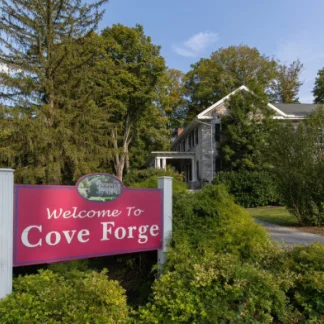Cove Forge Behavioral Health Center
Williamsburg, Pennsylvania, 202 Cove Forge Road, 16693
Available Programs
- Adult program
- Program for men
- Program for women
- Young adult program
Insurance and Financial
- Medicaid
- Private insurance
- Self-pay options
- Financial aid
About this Facility
Cove Forge Behavioral Health is an addiction and dual diagnosis treatment center for men and women located in Williamsburg, Pennsylvania. Their continuum of care provides support from the initial stages of treatment all the way to aftercare.
At Cove Forge Behavioral Health Williamsburg, addiction services include detox, residential, partial hospitalization, outpatient, medication assisted treatment, and dual diagnosis treatment. They also provide a faith-based track and a specialty program for Veterans.
The detoxification program is an inpatient non-hospital detoxification program that is designed to help individuals safely withdraw from physically addicting drugs, such as alcohol, opioids, and sedative-hypnotics. Medical staff monitor the process 24-hours a day and the average length of stay is three to five days.
Cove Forge’s inpatient program is a non-hospital rehabilitation setting offering their most intensive level of treatment. It is for adults age 18 and over who have a primary diagnosis of chemical dependency. The average length of stay is two to four weeks, which includes clinical therapies and group support.
PHP at Cove Forge Behavioral Health Williamsburg is a co-ed treatment program that helps individuals achieve and maintain abstinence. They learn tools of recovery and the stages of relapse, begin 12 Step meetings, and establish an aftercare plan. This program is for adults age 18 and over.
The outpatient program is designed to be utilized after the more intensive and structured programming of residential or partial hospitalization programs are completed. Cove Forge’s outpatient services in Williamsburg incorporate traditional clinical treatment approaches, along with musical therapy and educational classes.
Dual diagnosis, often referred to as having co-occurring disorders, is when two or more mental health concerns present themselves simultaneously. It is very common for those who struggle with addiction to also have an underlying mental health concern such as anxiety, depression, or a diagnosable psychiatric disorder. Without proper treatment of the mental health issue at hand, getting and staying sober can be difficult. By treating both the substance use disorder and the mental health needs concurrently, a greater chance for long-term sobriety is achieved.
Contact us for more information: (814) 554-0149

Contact Cove Forge Behavioral Health Center
Connect with Cove Forge Behavioral Health Center by calling their admissions team directly.
(814) 554-0149 Website Get Directions